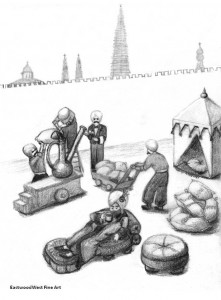Turban Decay
Posted in General, On This Day on September 12th, 2014 by Eugene Finerman – 3 CommentsSeptember 12th, 1683: The Ottoman Empire Begins Its Retreat to Oblivion
 First, the official version: Vienna is besieged by the Ottomans but an army led by Poland’s King Jan Sobieski routs the Moslem horde and saves Western Civilization.
First, the official version: Vienna is besieged by the Ottomans but an army led by Poland’s King Jan Sobieski routs the Moslem horde and saves Western Civilization.
Once you have dispensed with the grateful tears and a few bars of Chopin (how else do you thank Poland), I will give you the actual history.
Yes, the Ottomans did besiege Vienna in 1683. However, this was not the Ottoman Empire of 1483 or 1583, but the bloated parody of its martial glory. Uma Thurman had become Shelley Winters. This Ottoman army was no longer led by warrior kings; the Sultans–now cretins by birth or choice–rarely could find their way out of their harem. The army was now led by whichever courtier had bribed or connived the command.
The commanding pasha at Vienna was Kara Mustafa. He had an army of 140,000 men, but only a third of them were actual soldiers and their weapons were outdated. The other 90,000 men were basically support staff–and the pasha was enjoying the best coffee and cushions. Setting off from Constantinople in April, the Ottoman army lumbered upon Vienna in mid-July. Since an Ottoman horde was hard to ignore, Vienna had ample time to evacuated the civilian population. There was only a garrison of 18,000 left behind the walls of Vienna.
Even with their geriatric armaments, by sheer force the Ottomans could have taken the city. However, that would have been unprofitable for the Pasha. If Vienna were taken by storm, the Turkish soldiers would be entitled to whatever they could loot. On the other hand, if the city were besieged and starved into submission, then the Pasha would receive Vienna’s treasures. Guess which strategy Kara Mustafa preferred?
There are worse places to siege than Vienna in the summer. The Ottoman army enjoyed a pleasant two months of pillaging the Austrian countryside. However, their vacation ended rather abruptly–on this day in 1683–with the arrival of an allied army led by Jan Sobieski. The Pasha evidently had overlooked that possibility. Worse, although Sobieski’s force was half the size of the Pasha’s, the Christian army was composed of soldiers rather than servants. It turned out that the Turkish army was much faster when retreating than advancing. And, indeed, the Ottoman Empire now would be retreating for the next 250 years.
(Yes, in their haste, the Turks left behind sacks of coffee beans. The Poles were entitled to the pick of the loot but were not interested in a sober beverage; so they gave the Turks’ caffeine to the Viennese who made it into an art.)
For his role in the debacle, Kara Mustafa did not receive the Medal of Freedom. He was strangled and then beheaded. So the Sultan was not a complete cretin.
And was Christendom saved? Well, it never was in danger. The Ottoman Empire had no plans for mosques in Moscow or Turkish baths in Bath. This was simply a turf war between Turkey and Austria, and the winner would get Hungary. Furthermore, if this had been a clash between Islam and Christendom, then Turkey had a very strange ally: the leading power of Western Civilization. You see, the Hapsburgs were fighting on two fronts: in the East against the Turks, and in the West against France. Yes, France and Turkey were allies of long-standing, with over a century of coordinated attacks against the Hapsburgs.
Indeed, while Austria was marshalling and mortgaging its resources against Turkey, there was little left to defend the west bank of the Rhine from Louis XIV. Perhaps the French victories offered some solace to the Turkish Sultan. He may have lost Vienna and then Hungary, but his French buddy now owned Alsace and Lorraine.